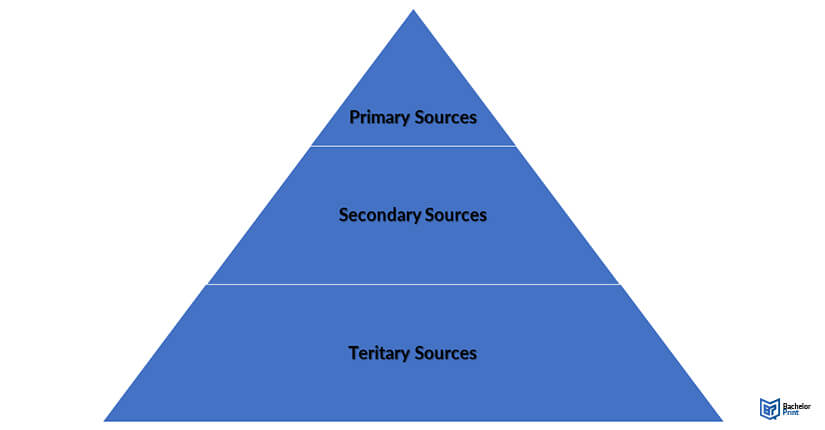
The research process is primarily about gathering data. Throughout the process, you will encounter various types of sources. When working with sources, it is vital to have a good understanding of the various types of sources that are commonly used for academic research and whether they are primary, secondary, or tertiary sources. Some of the most common ones are books, newspaper/magazine articles, and scholarly journals. This article provides a complete guide.
Definition: Types of sources
A research source refers to a place or material where the researcher finds pertinent data or resources for a particular study. These sources are grouped into specific types:
- Books and textbooks
- Newspapers
- Scholarly journals
- Government reports and legal documents
- Digital & electronic sources, like websites
In research, you will encounter a wide range of sources. The type of source you include in academic writing depends on the writing stage.
Types of sources: Scholarly journals
Academic journals are the best place to go if you are looking for the most up-to-date scholarly sources. This is because the journals are typically published several times annually. Also, they contain radical research and contributions from reputable scholars and scientists.
You can apply various types of scholarly articles in research, such as:
| Articles on original research | They contain originally published data |
| Theoretical articles | They contribute to the notional fundamentals of a study field |
| Analysis articles | They recap the present state of a specific study field |
Reputable journals take advantage of peer review, where experts assess the quality and credibility of the content before its publication. Additionally, they use academic or technical dialects.
You can access academic journals online or in print materials or from institutional libraries.
Types of sources: Websites
Websites are fantastic types of research for preliminary studies. For instance, you can use them to learn more about your topic of choice.
However, websites are not always 100% credible. Also, many websites do not provide their content author’s names. Furthermore, most websites do not cite their sources, and they do not subject their data to peer-review.
Therefore, you should analyze websites to determine their appropriateness before using website research sources.
For instance, it would be wise to use websites with URLs ending with
- .edu (for educational resources)
- .giv (for government-related resources).
Types of sources: Books
Books are also excellent research sources for in-depth information on your study topic. They are more reliable than most sources because individuals or multiple experts write them and provide extensive analysis on specific research areas.
Additionally, the books are overseen by an editor before their publication. Books by respected scholarly publishing houses and university presses are considered the most trustworthy research sources.
Published academic books are credible because they contain a full bibliography and apply technical dialect. However, books are authored for general audiences because they are typically irrelevant in scholarly contexts.
You can access research books online, in print, or in institutional libraries.
Types of Sources: Newspapers and magazines
Newspapers and magazines are go-to research sources if you want insight into current and past trends and news.
However, when written from biased perspectives or for promotional or political agendas, they may not be reliable for academic research. Also, articles in newspapers typically don’t cite their sources.
Regardless, you can use newspapers if you need data on recent events and topics that have not yet been researched in-depth by academicians. Aged newspapers are also a fantastic source of historical research. Furthermore, magazines specializing in particular topics can make good types of sources for research.
You can access newspaper sources in digital or print form or from library archives.
Types of sources: Interviews
Interviews are great primary research sources because they give you information right from the source. So, they contain the interviewees’ names for you to determine if they are credible. Also, you can cite them as primary types of sources in your references.
However, it would be wise to note that bias from the interviewee may influence the content’s credibility. For instance, emotional interviewees do not make credible academic research sources. Also, bias in how the interviewer interpreted the answers from the interviewee may influence credibility.
You can reduce bias by getting interviews from diverse teams or applying inclusion measures and psychological safety in interview procedures.
Printing Your Thesis With BachelorPrint
- High-quality bindings with customizable embossing
- 3D live preview to check your work before ordering
- Free express delivery
Configure your binding now!
Types of sources: Primary, secondary, and tertiary
All types of sources used in research are categorized into the following three categories:

Primary sources
These provide direct evidence about a research topic, like news articles. Their benefit is that you can rest assured that the content is from original sources. However, the content may be incomplete or unusable. In this case, it is advisable to find other sources to support incomplete information.
Secondary sources
These types of sources provide interpretations of primary research sources. They include journal articles. These types of sources address the downsides of primary sources. However, the content may be influenced by biases from writers and co-producers.
Tertiary sources
These types of sources summarize or consolidate primary and secondary types of sources. However, they do not provide extra insights. They include encyclopedias. These types of resources are easy to access and concise. However, they may contain outdated or incorrectly interpreted information.
FAQs
The most commonly used types of sources in research are digital and electronic sources, like:
- Websites
- Books
- Newspapers
- Journals
- Encyclopedias
You need various research sources to help you gather information related to your study topic. Therefore, the sources will help make your research process a success.
The type of sources you apply depends on the research topic and the goals of your study. However, you will likely use several types throughout the entire research process.
You can find research sources on the internet or in the library. Consulting journals and peer reviews can also help you in the research process.